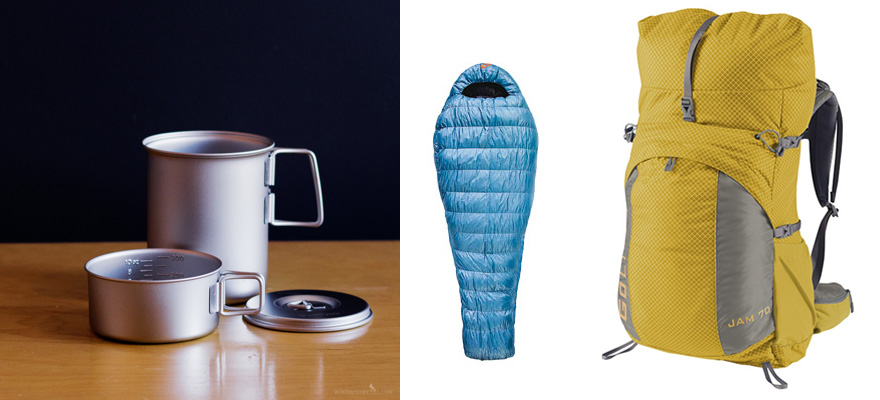High-Efficiency Hiking: What the Heck Is Ultralight?

Given that most of you love oddly specific minimalism, you should be familiar with "Ultralight" backpacking. If not, start here. Regardless of your fitness level, the appeal of ultralight is undeniable—it speaks to the core of good design: make it simpler, keep it functional. UL definitions vary in pound-maximums and philosophies, but for most it boils down to the fact that the lighter your gear, the more you are free to do. For the hardcore aficionados, UL is literally a lifestyle, where the weight of everything is known in grams and ounces and enthusiastically hacked away at. For the general practitioner, the aim is to carry as little as possible outdoors without sacrificing safety. General guidelines often suggest that a full pack should weigh less than 10lbs to qualify as UL, and under 25 to make it into the lightweight bracket. (When in doubt, call things "lightweight" rather than UL if you want to avoid the semantic title-mongering of true believers.)
While all detail-oriented hobbies attract a certain percentage of wonks, UL is a growing trend for a reason. Efficiency out on the trail/mountain/river/etc. is a big part of the draw, along with the basic body-mechanical fact that lowering pack weight reduces strain and increases comfort... Comfort you are free to negate by doing something painful like a through hike. How many of us have tried "backpacking" only to find it a gigantic heavy drag? It may seem obvious from a designer's armchair, but simplifying the systems frees the user to focus on other things, like the beauty of the trail. And counter-intuitive though it may be, removing the load bearing structure and cushy padding and webbing and pockets and D-rings on a backpack can actually make it more comfortable. Rather than trying to be every bag for everyman, Ultralight gear is task-specific, minimal, and as a result ergonomically approachable.

The principle of outdoor efficiency isn't new (check out Grandma Gatewood), but Ultralight is largely seen as an invention of the 1990s and an organic outgrowth of the hiking and outdooring community. As more people spent more time out on trails, many of them developed personal solutions and modifications to reduce the bulk or heft of the gear they needed. Word of mouth, self-published information and forums carried weight-saving ideas between users. Meanwhile developments in technical materials pushed outdoor designs into weird new territory. Some people gave up traditional tents in lieu of more compact tarps, ditching the poles and saving major space and weight. Other solutions shrank the bedding and cooking equipment. Who needs a handle on their toothbrush?
As components became more efficient, so did bags, since the less you carry the less you need to carry it in. It's now a basic assumption that going ultralight means reducing the base weight of your bedding, shelter and pack. As arguably the most bodily-relevant component, pack design has seen major trend shifts in the last few decades. Popular styles have veered from the heavy external framed packs that a Victorian scout would have lugged through the Alps to a myriad of integrated frame types, as well as frameless packs that look like garbage bags, and back to re-envisioned external systems.

The design solutions to the ongoing lightness "problem" are all over the board and as diverse as the people using them, but the core principle is the same: The less you have to carry, the more energy you'll have for the adventure you're on. The UL school of thought still has deep roots in the DIY tradition but there is a growing industry around production ultralight packs. Some companies have adapted their products to meet the demand for lighter and lighter gear, while others have sprung up out of the ultralight community itself with that niche as their sole focus. To dig into how ultralight design works, and who's doing the work, stay tuned for our upcoming interviews with key designers in the field!
» Mike St. Pierre of Hyperlite Mountain Gear
» Mike Pfotenhauer of Osprey Packs
» Michael Meyer of Granite Gear
-
oFavorite This
-
Q2Comment
K
{Welcome
Create a Core77 Account
Already have an account? Sign In
By creating a Core77 account you confirm that you accept the Terms of Use
K
Reset Password
Please enter your email and we will send an email to reset your password.


Comments